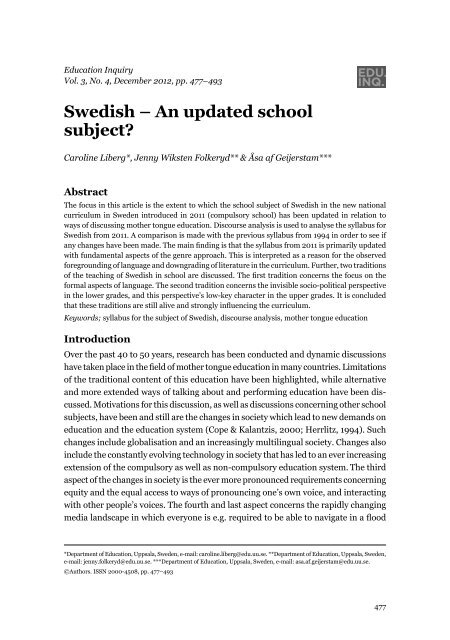Download issue - Lärarutbildning - Umeå universitet
Download issue - Lärarutbildning - Umeå universitet
Download issue - Lärarutbildning - Umeå universitet
You also want an ePaper? Increase the reach of your titles
YUMPU automatically turns print PDFs into web optimized ePapers that Google loves.
Education Inquiry<br />
Vol. 3, No. 4, December 2012, pp. 477–493<br />
EDU.<br />
INQ.<br />
Swedish – An updated school<br />
subject?<br />
Caroline Liberg*, Jenny Wiksten Folkeryd** & Åsa af Geijerstam***<br />
Abstract<br />
The focus in this article is the extent to which the school subject of Swedish in the new national<br />
curriculum in Sweden introduced in 2011 (compulsory school) has been updated in relation to<br />
ways of discussing mother tongue education. Discourse analysis is used to analyse the syllabus for<br />
Swedish from 2011. A comparison is made with the previous syllabus from 1994 in order to see if<br />
any changes have been made. The main finding is that the syllabus from 2011 is primarily updated<br />
with fundamental aspects of the genre approach. This is interpreted as a reason for the observed<br />
foregrounding of language and downgrading of literature in the curriculum. Further, two traditions<br />
of the teaching of Swedish in school are discussed. The first tradition concerns the focus on the<br />
formal aspects of language. The second tradition concerns the invisible socio-political perspective<br />
in the lower grades, and this perspective’s low-key character in the upper grades. It is concluded<br />
that these traditions are still alive and strongly influencing the curriculum.<br />
Keywords; syllabus for the subject of Swedish, discourse analysis, mother tongue education<br />
Introduction<br />
Over the past 40 to 50 years, research has been conducted and dynamic discussions<br />
have taken place in the field of mother tongue education in many countries. Limitations<br />
of the traditional content of this education have been highlighted, while alternative<br />
and more extended ways of talking about and performing education have been discussed.<br />
Motivations for this discussion, as well as discussions concerning other school<br />
subjects, have been and still are the changes in society which lead to new demands on<br />
education and the education system (Cope & Kalantzis, 2000; Herrlitz, 1994). Such<br />
changes include globalisation and an increasingly multilingual society. Changes also<br />
include the constantly evolving technology in society that has led to an ever increasing<br />
extension of the compulsory as well as non-compulsory education system. The third<br />
aspect of the changes in society is the ever more pronounced requirements concerning<br />
equity and the equal access to ways of pronouncing one’s own voice, and interacting<br />
with other people’s voices. The fourth and last aspect concerns the rapidly changing<br />
media landscape in which everyone is e.g. required to be able to navigate in a flood<br />
*Department of Education, Uppsala, Sweden, e-mail: caroline.liberg@edu.uu.se. **Department of Education, Uppsala, Sweden,<br />
e-mail: jenny.folkeryd@edu.uu.se. ***Department of Education, Uppsala, Sweden, e-mail: asa.af.geijerstam@edu.uu.se.<br />
©Authors. ISSN 2000-4508, pp. 477–493<br />
477

















